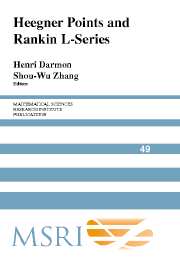Book contents
- Frontmatter
- Contents
- Preface
- Heegner Points: The Beginnings
- Correspondence
- The Gauss Class Number Problem for Imaginary Quadratic Fields
- Heegner Points and Representation Theory
- Gross–Zagier Revisited
- Special Value Formulae for Rankin L-Functions
- Gross-Zagier Formula for GL(2), II
- Special Cycles and Derivatives of Eisenstein Series
- Faltings' Height and the Derivatives of Eisenstein Series
- Elliptic Curves and Analogies Between Number Fields and Function Fields
- Heegner Points and Elliptic Curves of Large Rank over Function Fields
- Periods and Points Attached to Quadratic Algebras
Preface
Published online by Cambridge University Press: 06 July 2010
- Frontmatter
- Contents
- Preface
- Heegner Points: The Beginnings
- Correspondence
- The Gauss Class Number Problem for Imaginary Quadratic Fields
- Heegner Points and Representation Theory
- Gross–Zagier Revisited
- Special Value Formulae for Rankin L-Functions
- Gross-Zagier Formula for GL(2), II
- Special Cycles and Derivatives of Eisenstein Series
- Faltings' Height and the Derivatives of Eisenstein Series
- Elliptic Curves and Analogies Between Number Fields and Function Fields
- Heegner Points and Elliptic Curves of Large Rank over Function Fields
- Periods and Points Attached to Quadratic Algebras
Summary
Modular curves and their close relatives, Shimura curves attached to multiplicative subgroups of quaternion algebras, are equipped with a distinguished collection of points defined over class fields of imaginary quadratic fields and arising from the theory of complex multiplication: the so-called Heegner points. It is customary to use the same term to describe the images of degree zero divisors supported on these points in quotients of the jacobian of the underlying curve (a class of abelian varieties which we now know is rich enough to encompass all elliptic curves over the rationals). It was Birch who first undertook, in the late 70's and early 80's, a systematic study of Heegner points on elliptic curve quotients of jacobians of modular curves. Based on the numerical evidence that he gathered, he observed that the heights of these points seemed to be related to first derivatives at the central critical point of the Hasse–Weil L-series of the elliptic curve (twisted eventually by an appropriate Dirichlet character). The study initiated by Birch was to play an important role in the number theory of the next two decades, shedding light on such fundamental questions as the Gauss class number problem and the Birch and Swinnerton-Dyer conjecture.
The study of Heegner points took off in the mid-1980's thanks to two break-throughs. The first of these was the Gross–Zagier formula, which, confirming Birch's observations, expressed the heights of Heegner points in the jacobian of the modular curve X0(N) in terms of the first derivative at the central point of an associated Rankin L-series.
- Type
- Chapter
- Information
- Heegner Points and Rankin L-Series , pp. ix - xiiiPublisher: Cambridge University PressPrint publication year: 2004

